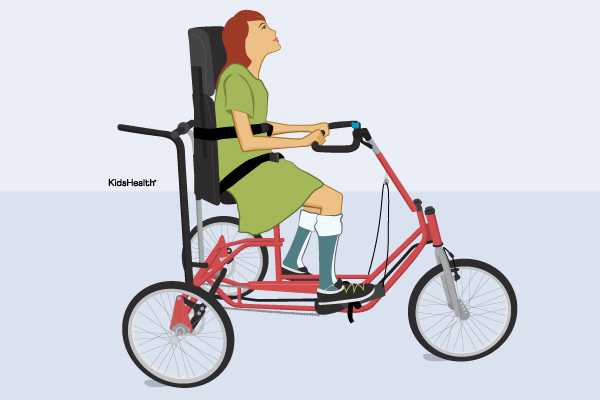- Parents Home
- Para Padres
- A to Z Dictionary
- Allergy Center
- Asthma
- Cancer
- Diabetes
- Diseases & Conditions
- Doctors & Hospitals
- Emotions & Behavior
- First Aid & Safety
- Flu (Influenza)
- Food Allergies
- General Health
- Growth & Development
- Heart Health & Conditions
- Homework Help Center
- Infections
- Newborn Care
- Nutrition & Fitness
- Play & Learn
- Pregnancy Center
- Preventing Premature Birth
- Q&A
- School & Family Life
- Sports Medicine
- Teens Home
- Para Adolescentes
- Asthma
- Be Your Best Self
- Body & Skin Care
- Cancer
- Diabetes
- Diseases & Conditions
- Drugs & Alcohol
- Flu (Influenza)
- Homework Help
- Infections
- Managing Your Weight
- Medical Care 101
- Mental Health
- Nutrition & Fitness
- Q&A
- Safety & First Aid
- School, Jobs, & Friends
- Sexual Health
- Sports Medicine
- Stress & Coping
What's an Adaptive Bicycle?
What Is an Adaptive Bicycle?
An adaptive bicycle is a supportive, 3-wheeled bicycle for kids with disabilities who can't ride a 2-wheeler independently. The bike has a wide wheel base and straps to help give body support to the rider.
Is an Adaptive Bicycle Right for My Child?
An adaptive bike can give some independence to kids who have good head control, some torso control, and the ability to control most arm and leg movements. Also, kids with poor or fair head control who have an attendant who can steer and assist may benefit from adaptive bikes.
Are Adaptive Bicycles Covered by Insurance?
Adaptive bicycles aren't usually covered by insurance. But your child may be eligible for funding through a social program. Ask your child's doctor for more information.

- Cerebral Palsy (CP) (Topic Center)
- Caring for Your Child With Cerebral Palsy (CP): Birth to Age 5
- Caring for Your Child With Cerebral Palsy (CP): Age 6–12
- Caring for Your Teen With Cerebral Palsy (CP): Age 13 and Up
- Occupational Therapy

© 1995- The Nemours Foundation. KidsHealth® is a registered trademark of The Nemours Foundation. All rights reserved.
Images sourced by The Nemours Foundation and Getty Images.